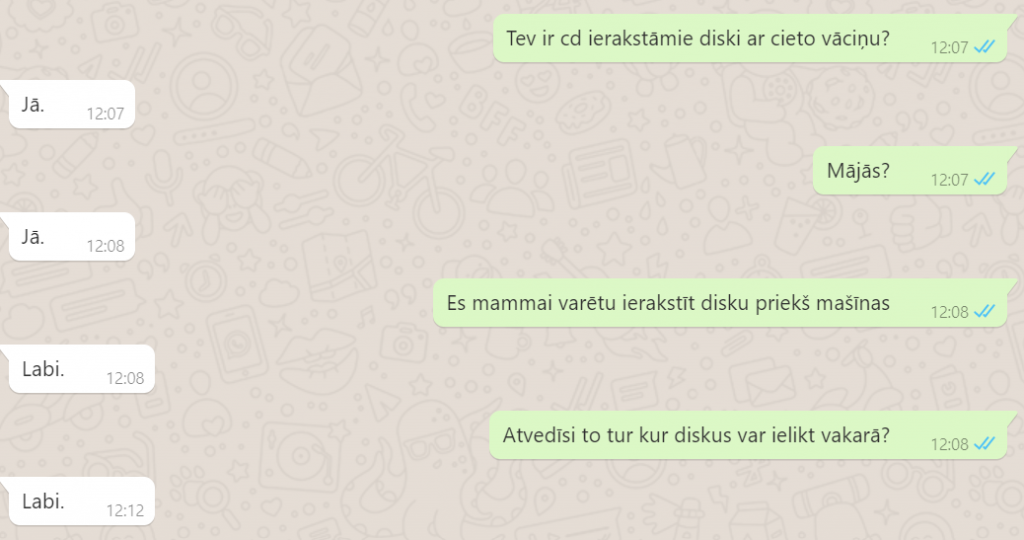I’m sure many people my age can relate to feeling like their parents text in a weird way (if they even text at all). They always capitalize the beginnings of their sentences, they use ellipses in weird places, and they definitely don’t understand what certain emojis mean. But how come they have a completely different notion of texting than we do?
It would be easy to just justify the way older people (for the sake of a better categorization) text by just saying that they don’t understand or don’t follow trends the same way younger people do. This might be partially true for some, but it’s not the whole story.
What’s up with the way parents text?
The biggest difference between our generations is that most people my age were born when informal written communication had already been established as a “real thing”, or, at least, something very common. We learned it subconsciously when we started to use the internet and to communicate via texting or online chatting at quite a young age. For most of our parents, however, online communication was a skill they had to learn probably somewhere in their twenties, when emailing became a part of people’s everyday lives. Before that, most of the written communication that was present in their lives was much more formal than we are used to, like letters sent through snail mail that had proper conventions for how they should be written. When our parents’ generation moved on to using online communication, they took these conventions with them. For example, as I’ve discussed with my dad, for him, it “feels right” to type in a grammatically correct way even when texting – after all, that’s how he was taught to communicate through writing when he was in school.

In this text conversation with my dad, for example, you can see how he finishes even one-word answers with a full-stop when he responds to my questions. For most people my age, this comes off as cold and as if the person writing this is mad or unhappy when answering the questions I am asking, but for my dad it just feels like the polite way to answer in written communication. Doing some research on the phenomena of using a full-stop in written communication, and why it has such connotations of seriousness, I came across many articles discussing text speech. The consensus seems to be similar to what I already had heard from my dad – that for older people, the conventions for texting are similar, if not the same, as the conventions for other written communication; thus, they are not very comfortable with being “informal” in written communication.
Is online communication ruining written language?
I’m sure I’m not the only one who has heard people (who are usually a bit older) complaining about how teenagers and young people are “ruining” language, especially when it comes to using slang, abbreviations in texting, and many other things. A quick Google search will show article after article debating this idea that not using “proper grammar” (whatever that means…) will somehow lead to the extinction of “the right way to write” or even language as a whole.

However, if you ask any linguist, they will reassure you that this, in fact, is not the case. So, what exactly is happening in online communication that is pushing people to not write “grammatically correct”?
Though there are many answers to this, what it mostly comes down to (when talking about informal communication) is that we are trying to imitate real-life spoken communication. In his video on texting, Tom Scott talks about how people try to imitate intonation in written communication in order to have a more realistic conversation. This means that new conventions have come about that have become a part of the way we communicate through texting, which look much different than what our parents’ generation are used to. Capitalizing certain letters conveys stress, using capital letters means that what is being texted would probably be said loudly, and spelling doesn’t always matter. In short – online communication could be classified as its own way of speech; an online dialect.

These new conventions can be hard to understand if you have not been exposed to them; for someone like my dad, it probably looks like my friend in this text communication hasn’t paid enough attention to type correctly, when, in fact, what she has texted has been written in her “online dialect” that I am able to read in the intonation that she probably was trying to convey. For younger people nowadays, this has become the standard way to talk online, and, as long as we understand it and use it, it is probably not going anywhere.
So, what does this all mean?
Well, for one, what we should all keep in mind when texting is to be aware of our recipient’s use of language online. Your dad probably won’t understand the newest internet jargon, but that does not mean that you should feel discouraged from using it with people who do understand it. Written online communication is a prominent part of our daily lives now more than ever, and if you want to use it to its full advantage, you probably shouldn’t feel too ashamed of your “online dialect”.
Sources:
Why Your Parents Suck At Texting by Answer in Progress
why texting like this is sometimes okay. by Tom Scott
Is it The End For Full Stops by Trisha Dunbar



Interesting problem to address in your blog. I wasn’t aware of the fact that other people of my age too were bothered when parents end every message with a full stop. It is fascinating how code-switching, which already existed before the digital era, can take its own form in the use of digital dialects.
Interesting blog and I can definitely relate to this issue. What I find outstanding is also the difference between texting with friends and your parents/elderly people. For a certain reason, we always start using punctuation/fewer details when we talk to our parents for example. It is not only, in this case, your dad, who texts weird, but also the younger generation, as we adapt to their ‘standards’.
Indeed, it’s a phenomenon that I have observed with my parents as well. Instead of, for instance, texting “haha” when they want to express that they are laughing, they would type it as “Ha, ha.” It seems almost archaic. On the other hand, their knowledge on emoji- and gif-etiquette is astonishingly well developped; it seems paradoxical, if not even comical, compared to their style of writing.
One other thing which I have noticed is that I also change my way of texting when I text with them. When I was younger, my parents would even go as far as to reprimand me for not using correct grammar whereas nowadays they have accepted that my manner of communication seems odd and unpolished, yet frequently better and optically more pleasing than what their friends seem to send them – basically, a sea of emojis.
For someone whose parents have Whatsapp but they choose to email me instead, I can only agree to the extent that our communication with parents and with peers differs massively. However, I’m starting to consider that it is not only a generational difference but possibly also cultural. Not so long ago I received the comment that British people use a lot of dashes ‘-‘. Whilst I am definitely guilty of this myself, it’s not something that can be truly testified but it’s evident when I have similar discussions with friends that different cultures use punctuation/emojis/abbreviations differently.
Such an interesting topic to write on, excellent job! Both of my parents are on either side of the scale. My dad, as yours does, always ends his texts with a full stop. I find it actually funny to notice that he does this with every single sentence (except for the sentences that end with one polite question mark, one exclamation mark, or an ellipsis). Occasionally he uses a well-placed emoji, always one, never several in a row, unlike me, who can use an abundance of emojis at once. So he does have a sense of what kind of emojis are suitable to use, but his texting style is somewhat old-fashioned with the use of all the correct punctuation. My mom, however, texts very ‘on-trend.’ She uses all kinds of abbreviations, never uses full stops, uses all the emojis that I also use, and texts in an informal way (which I like!).
Even though my parents are the same age and are raised with the same formal written communication etiquette, they react differently to language use in online communication. This shows that some people like to stay with the old-school formal style as my dad does, and others, such as my mom, grow with the new texting style that our generation is developing.
I think that everyone’s style of texting also depends on whom you are texting with. I text differently to different kinds of people. For example, I text informal with my parents and friends more formally to my driving instructor or work boss.